
‘Afraid of the water’? Life in a city that dumps billions of litres of raw sewage into lakes and rivers
10 billion litres of sewage are dumped into Winnipeg’s lakes and rivers each year. Some...
UNAMA’KI, Nova Scotia — On an overcast December day, father and son steam into St. Peter’s Bay in their battered sunflower-yellow Cape Island-style fishing boat, flying the red and white Mi’kmaq flag.
This is Michael and Avery Basque’s year.
They’re out here, off the shores of Unama’ki or Cape Breton Island in northern Nova Scotia, to fish, to haul their lobster traps out of the Atlantic. As band members of Potlotek First Nation, they are exercising their constitutionally-protected Treaty Rights to earn a moderate livelihood from fishing at a time when violence and racism is raging during the province’s long-simmering lobster war. It’s both a small act and a monumental step forward.
Out in the bay, Michael, the dad, consults his Samsung tablet, the everyman’s chart plotter, plugged into the helm of the boat.
Michael, primarily a snow crab fisherman and carpenter, lives an hour’s drive away with his wife and 13-year-old daughter in a tidy brown house behind a highway in Sydney. He bought this boat on Kijiji for $10,000 with a loan from the bank, furnishing it with lights, a new alternator, transmission, batteries and steering column.
His son Avery, 21, quit a stressful job delivering car parts from the back of his purple 2008 Hyundai Tiburon to learn to lobster fish with his father.
“It’s a great feeling picking up a full trap of lobster,” said Avery, who has added pounds of muscle to his lean frame since first starting out.
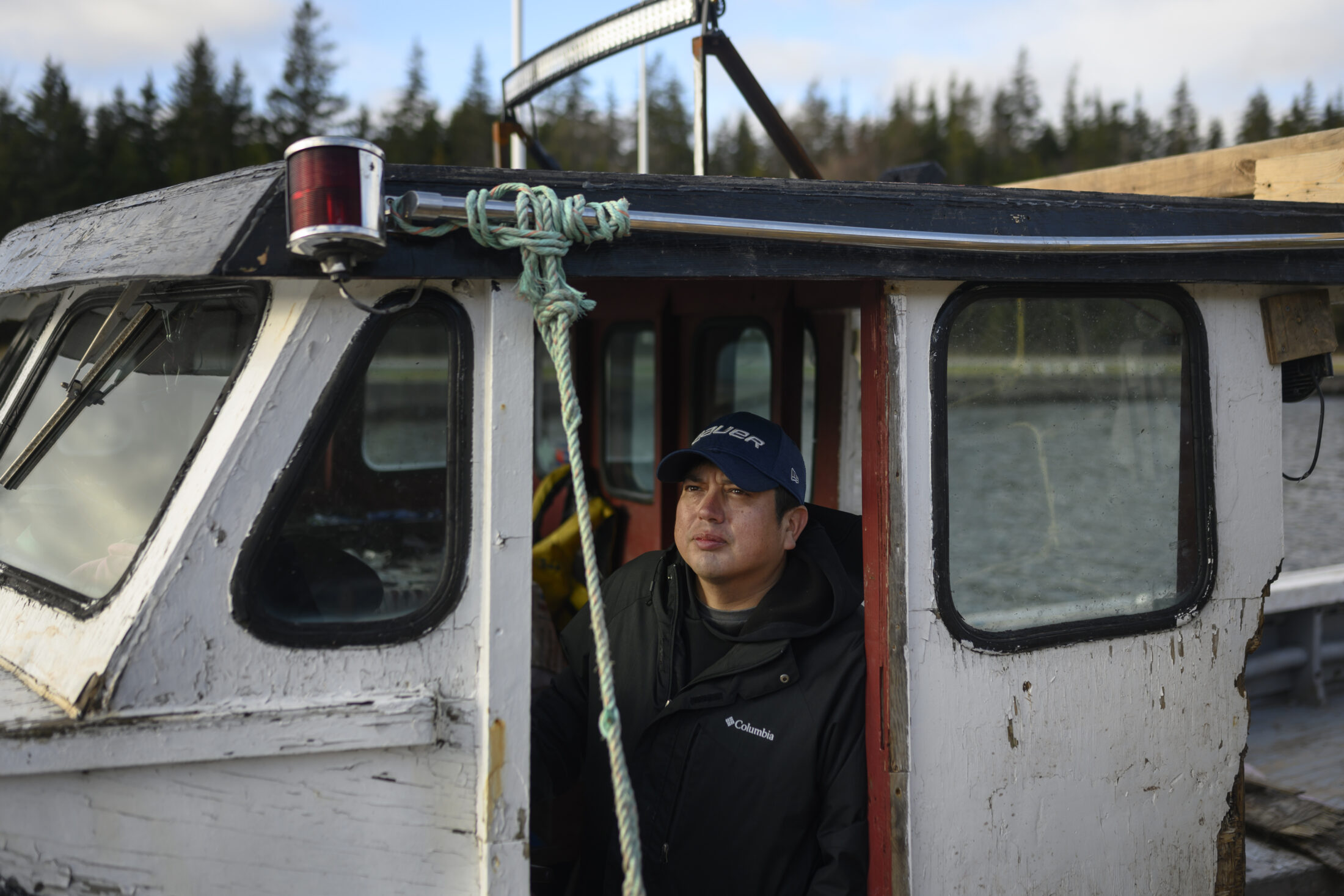
Mi’kmaq lobster boat captain Michael Basque, from Potlotek First Nation, poses on The Seventeen52, his wooden lobster boat, during his nation’s moderate livelihood fishery in St. Peter’s Bay, Cape Breton Island, N.S., in early December. The name of the lobster vessel is a reference to the treaty of 1752 with the British Crown upon which the Supreme Court of Canada based the Marshall Decision 21 years ago. Photo: Darren Calabrese / The Narwhal

Mi’kmaq fisher Avery Basque, from Potlotek First Nation, hauls heavy wooden lobster traps on a boat captained by his father during their nation’s moderate livelihood fishery. Photo: Darren Calabrese / The Narwhal
At first the Basques did it all by hand. Avery would pull reams of rope with the full weight of his body until the wooden lobster trap bobbed to the surface. Now they’ve earned enough to buy a $2,500 hydraulic hauler, which absorbs some of the heavy lifting.
On board, Avery and deckhand Warren Johnson, 16, pull the dripping 70-pound wooden lobster cage up and onto the boat’s gunnel. Most modern fishermen have done away with this style of trap in favour of the plastic ones you can lift with one hand. But these cost $3 each on a buy and sell website — a more affordable option for guys just starting out.
At first, trap after trap the young men pull up is empty. The catches have been down and some of the bait they were using wasn’t ideal. Also, lobsters are crawling further out to sea in search of cooler temperatures. The worn-out Seventeen52 can’t, in its current state, safely handle the high seas.
Finally, a trap comes up with several writhing lobsters. Johnson pulls them out and examines them. Seeded females, laden with tiny black eggs, get notched and thrown back. So do the softies, undersized ones that measure less than 84 millimetres. Two were keepers. Eventually the grey rectangle bin begins to come alive with eyes, antennae and dark teal shells.
Then an empty trap comes up with slashed netting — clearly the work of vandals who have cut the trap so lobsters can escape. Johnson whisks the trap to the back of the boat and stitches the openings together with zip tags. It’s something they’ve all come to expect.
“I know there’s gonna be hate, but I’m willing to be at the forefront of that hate. Someday, there won’t be any racism. Systemic racism will slowly go away,” Michael says. “Our communities aren’t going to be poor anymore.”
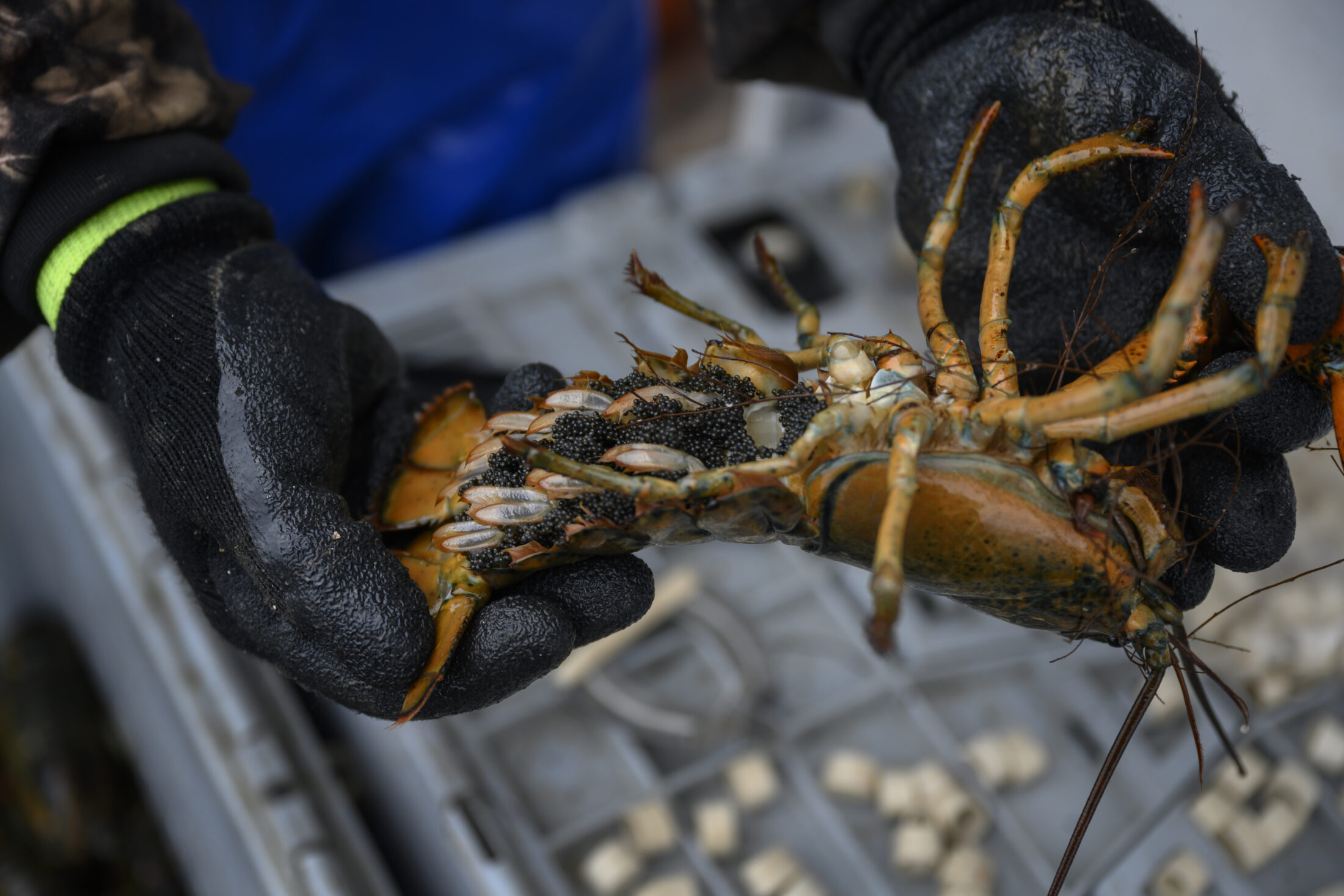
Mi’kmaq lobster fisher Warren Johnson, 16, from Potlotek First Nation, displays a berried (pregnant) female before returning it back to the ocean. Photo: Darren Calabrese / The Narwhal
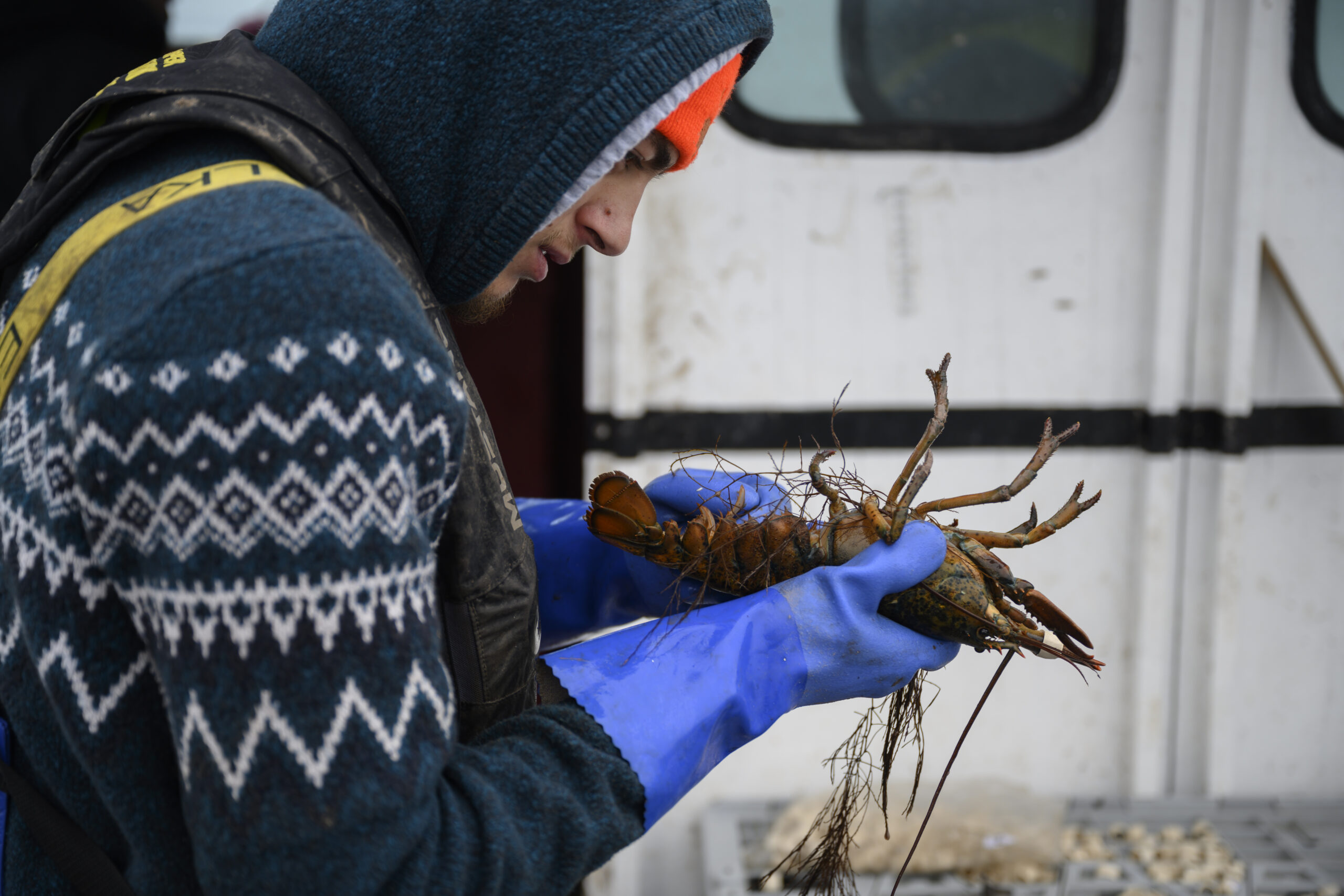
Avery inspects a lobster for eggs before returning it back to the ocean. Photo: Darren Calabrese / The Narwhal
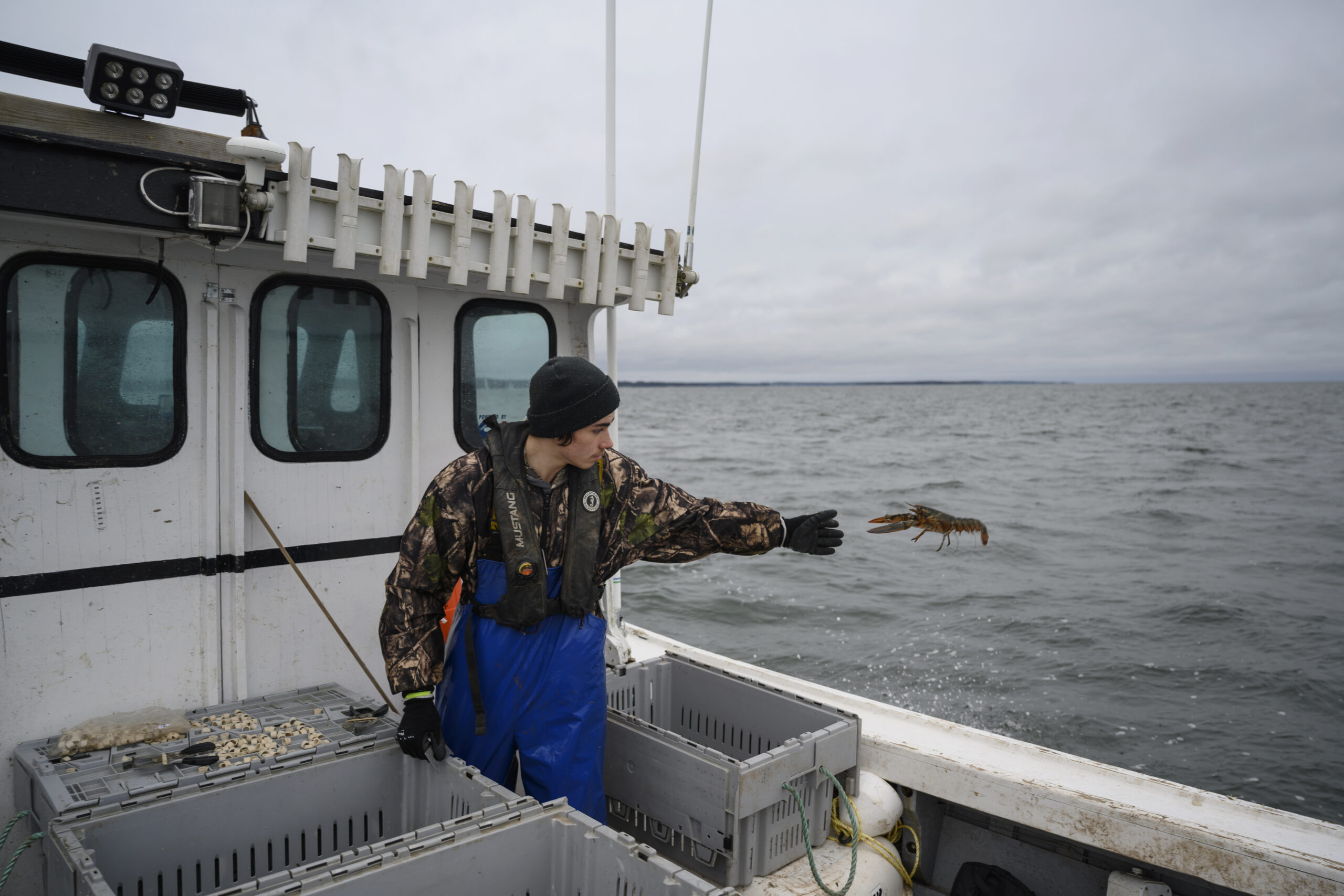
Johnson returns a lobster measuring under the size limit while harvesting on The Seventeen52. Photo: Darren Calabrese / The Narwhal
The Basques’ peaceful day on the water contrasts sharply with the backdrop of devastating racism and violence perpetrated against Indigenous lobster fishers in Nova Scotia as they began to more explicitly exercise their legal right to fish outside of commercial harvest dates this past fall.
The Indigenous Peoples who have fished in the waters off Nova Scotia for thousands of years — the Mi’kmaq, Wolastoqiyik and Passamaquoddy — are guaranteed the right to fish under historic treaties. Those rights are also recognized and affirmed under Section 35 of the Canadian Constitution.
But Treaty Rights in the Maritimes have never been fully acknowledged by government, even after the Supreme Court of Canada confirmed Mi’kmaq have the right to make a living fishing and hunting with the Marshall decision.
Donald Marshall Jr., a Mi’kmaq man from Cape Breton, had already spent 11 years in jail for a murder he didn’t commit when he was arrested for catching and selling eels without a license in 1993. The courts ruled in 1999 that Marshall and all Mi’kmaq have Treaty Rights to fish without a licence to secure a moderate livelihood, but stipulated that those rights can be interrupted for the sake of conservation.
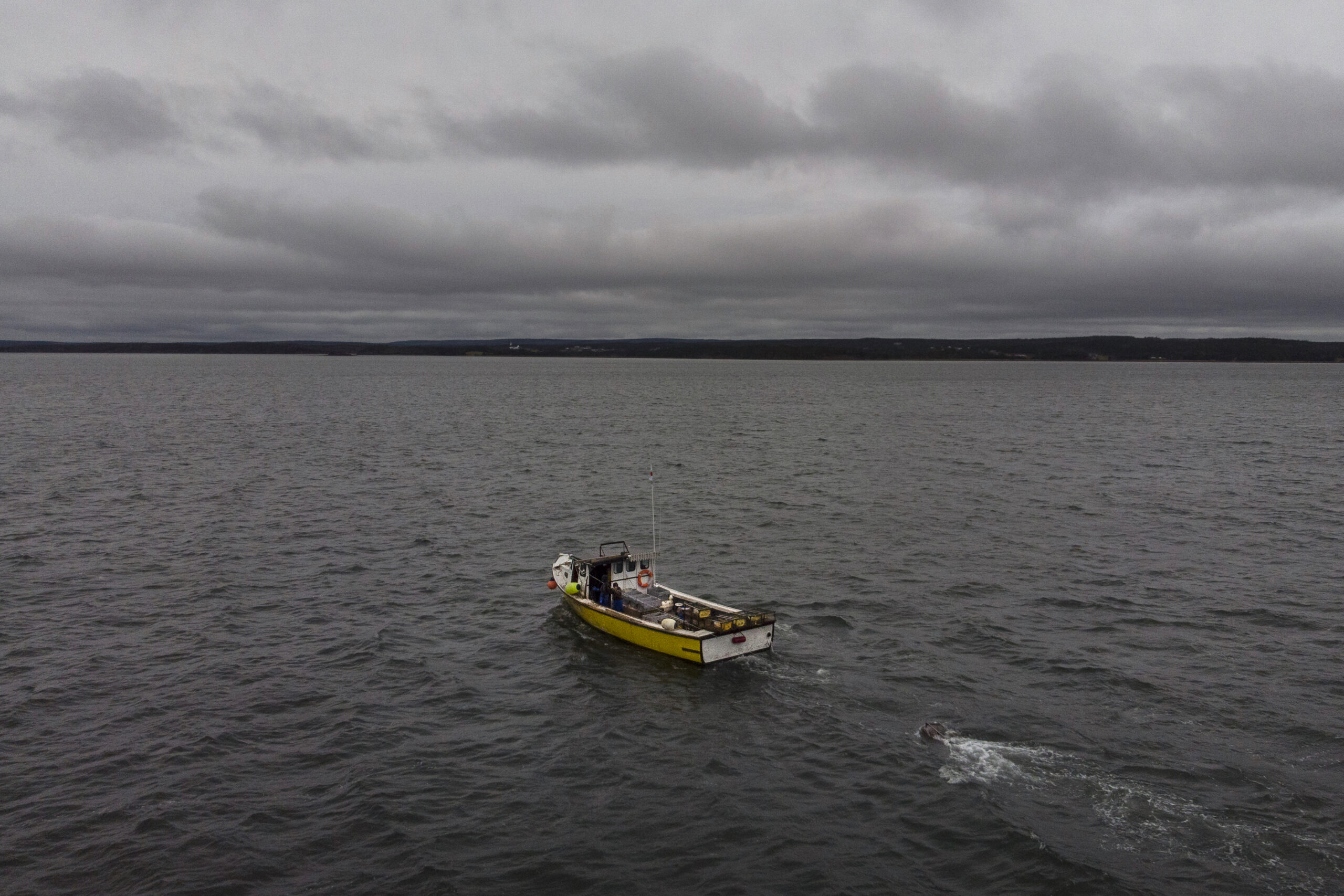
The Seventeen52 sails in St. Peter’s Bay, off the southern coast of Cape Breton Island, while the crew pulls in a lobster trap. In 1999, the Supreme Court of Canada ruled that all Mi’kmaq have Treaty Rights to fish without a licence in order to secure a moderate livelihood. Photo: Darren Calabrese / The Narwhal
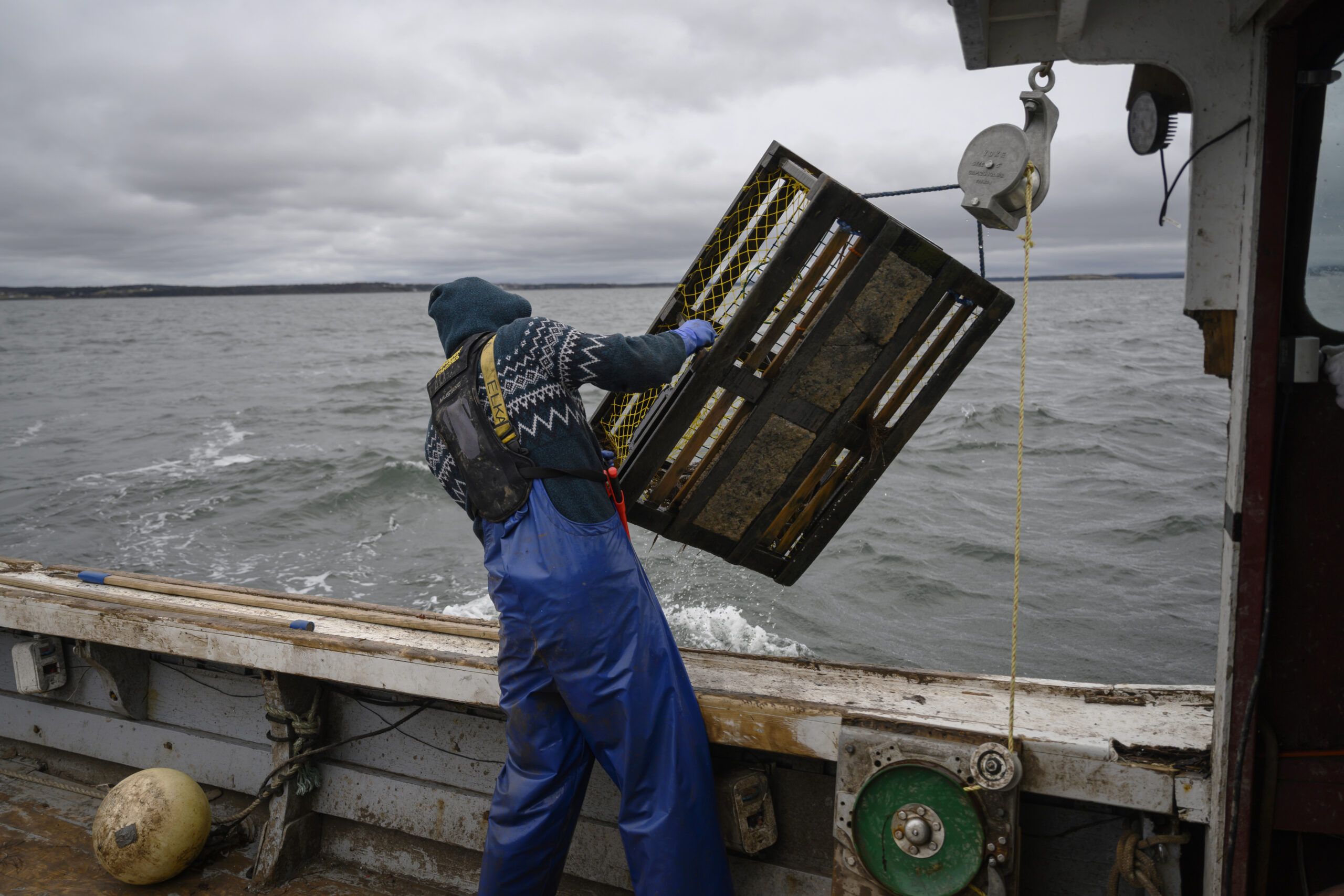
Avery hauls in a lobster trap from the waters off Nova Scotia where the Potlotek First Nation has launched a moderate livelihood fishery. Photo: Darren Calabrese / The Narwhal
The term “moderate livelihood” has been left undefined, and throughout the intervening decades, Indigenous fishers have been harassed, threatened and treated like poachers by settlers and the federal government alike.
These tensions came to a head after Sept. 17, the 21st anniversary of the Marshall decision, when, in the absence of any formal agreement with the federal government, the Sipekne’katik First Nation launched its own self-regulated moderate livelihood fishery. Reaction was swift and severe. Local commercial fishermen in southwest Nova Scotia, incensed at the Indigenous fishery, burned vehicles, mobbed two lobster pounds, sabotaged lobster traps and assaulted a chief. Membertou First Nation’s moderate livelihood traps were sabotaged. A Pictou Landing First Nation fisherman was recently shot at as he tried to prevent his traps from being cut.
Despite the ongoing tensions, other nations like Potlotek have drafted their own regulations for a moderate livelihood lobster fishery.
Potlotek launched its fishery on Oct. 1, Treaty Day in Nova Scotia, which marks the start of Mi’kmaq history month. The fishery was launched under the principle of Netukulimk, which, according to the Unama’ki Institute of Natural Resources, means to receive the gifts from Mother Earth responsibly and sustainably and leave nothing to waste.
It’s this fishery the Basques are taking advantage of in early December, about an hour’s drive north of where Donald Marshall Jr. was first arrested while fishing for eels.

Treaty lobster caught by Michael and his crew during Potlotek First Nation’s moderate livelihood fishery. Despite tensions surrounding Indigenous peoples’ right to fish, the Potlotek fishery has taken off in a quieter fashion. Photo: Darren Calabrese / The Narwhal
“I’m happy with what we’re doing but I’m not satisfied with how the government looks at us. They treat us like criminals,” Michael says as a Fisheries and Oceans Canada surveillance plane zooms overhead.
“We have a right to fish and we’ve been deprived of our right to fish.”
Despite the surrounding circumstances, the Potlotek lobster fishery has taken off in a much quieter fashion than other Indigenous livelihood fisheries in the southern part of Nova Scotia. And other nations are taking notice.
After seeing Potlotek’s success, members of Eskasoni First Nation have started arriving in St. Peter’s Bay to fish. Two others, Paq’tnkek and We’koqma’q, are also planning to launch self-governed fisheries.
We’koqma’q First Nation Chief Annie Bernard-Daisley described Potlotek’s fishery as “ground-breaking and historical.”
“They have helped pave the path to where each of our First Nations communities should be going,” she added.
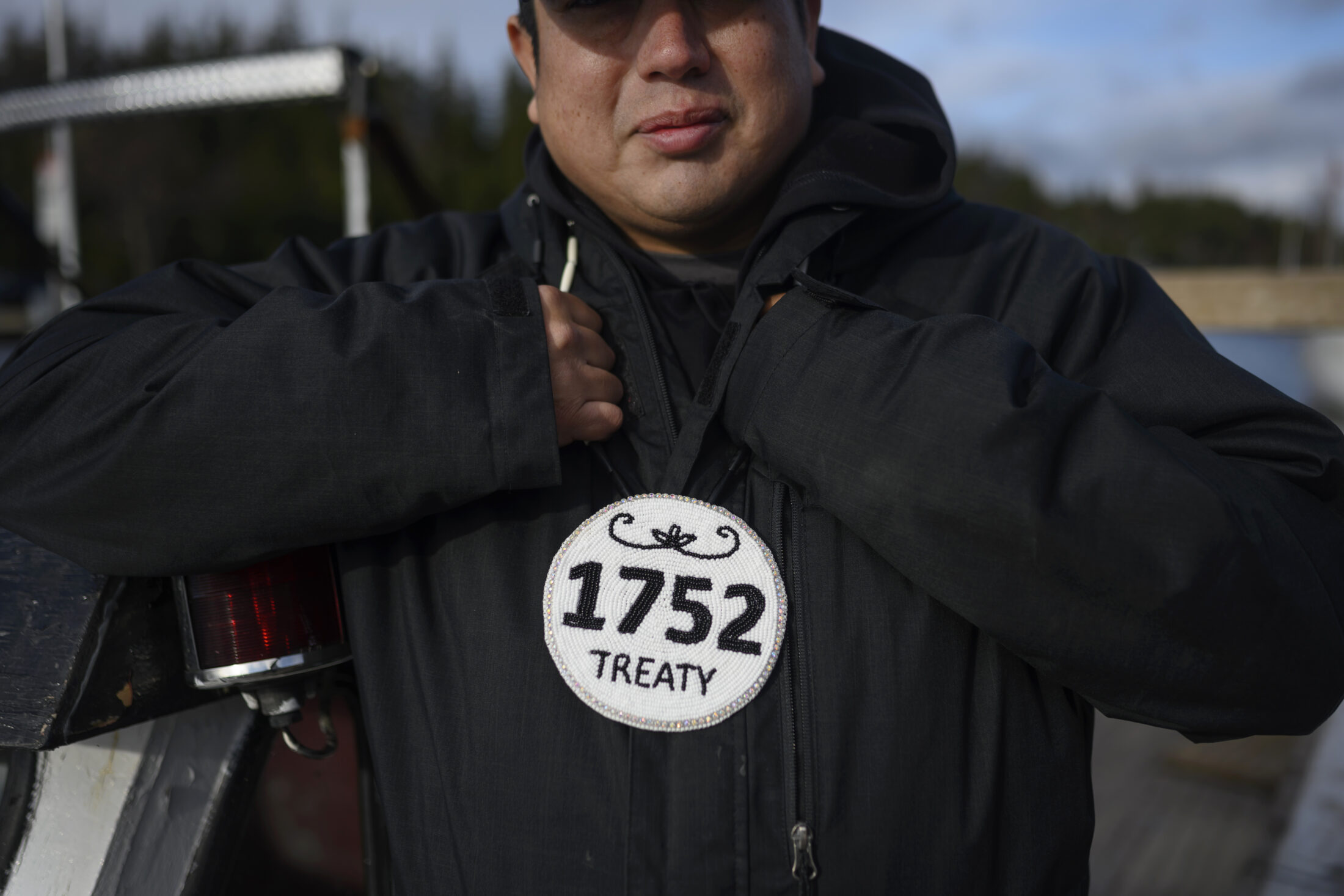
Michael shows off the regalia he wore on the first day of his nation’s moderate livelihood fishery. Photo: Darren Calabrese / The Narwhal
Aboard the Basques’ boat, The Seventeen52, named after the year the Mi’kmaq signed treaties, Michael tells me the lack of violence surrounding the Potlotek fishery is likely in part due to the isolation and connectedness of the local villages and hamlets. Cape Breton Island, attached to the mainland by a causeway, is populated with small rural communities of French Acadian, Scottish Gaelic, Black and Mi’kmaq people.
“We grew up with a lot of these guys, played hockey with these guys so the hate isn’t like it is in Saulnierville [in southwestern Nova Scotia] where they don’t understand natives are humans,” he said.
Another landmark difference is the response of the local fishermen’s union, which agreed not to retaliate or protest Potlotek’s moderate livelihood fishery. Gord MacDonald, head of the Richmond County Inshore Fishermen’s Association, told CBC this was because they didn’t want to shift the conversation from sustainability and conservation to racism like the fishermen in southwest Nova Scotia. “They actually taught us the lesson to be better and that’s what we’re trying to do,” he said.
But this restraint doesn’t mean local commercial fishermen are happy.
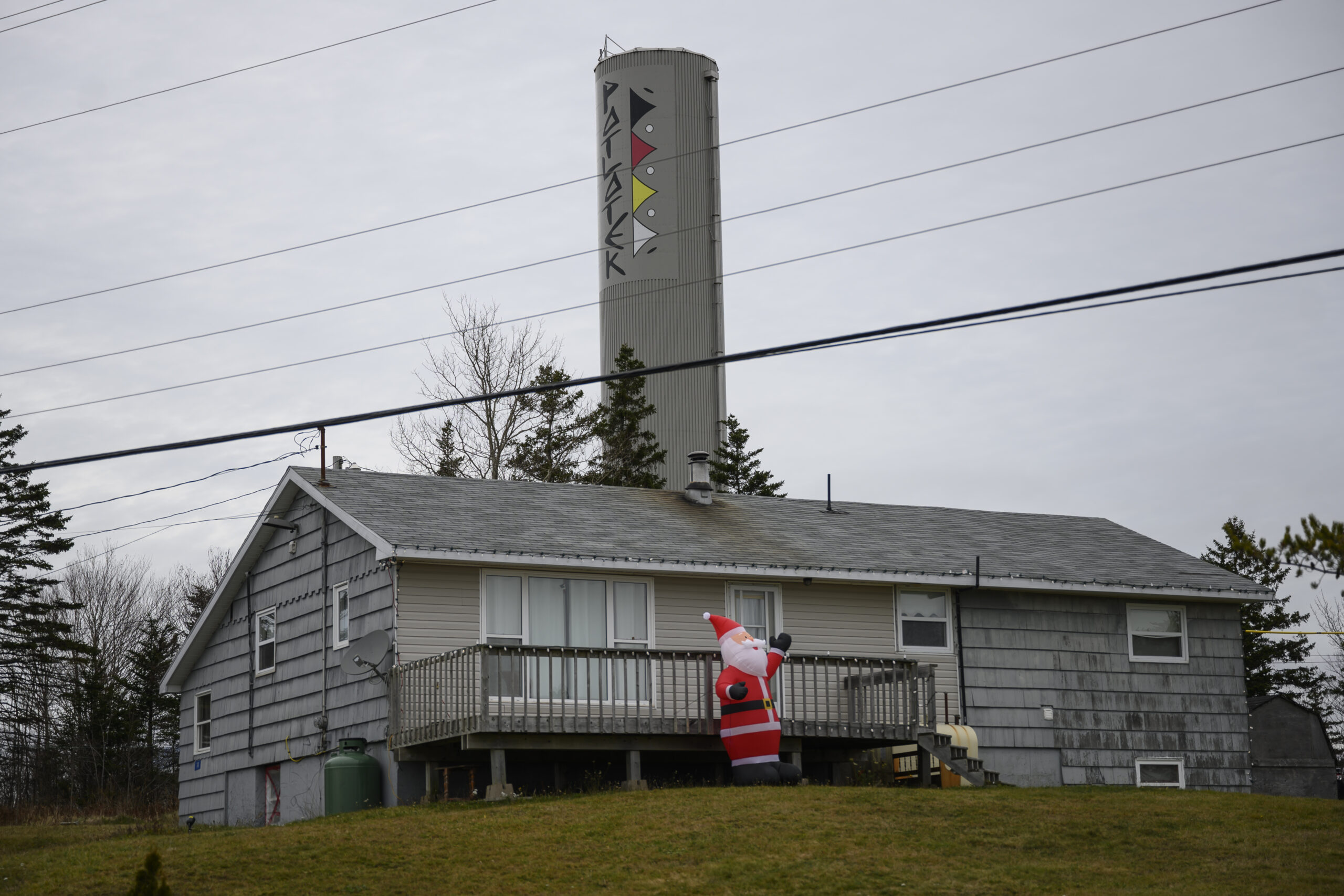
A home in the Mi’kmaq community of Potlotek First Nation on Cape Breton Island, N.S. Michael believes the lack of violence surrounding the Potlotek fishery could be because of the isolation and connectedness of the local villages and hamlets. Photo: Darren Calabrese / The Narwhal
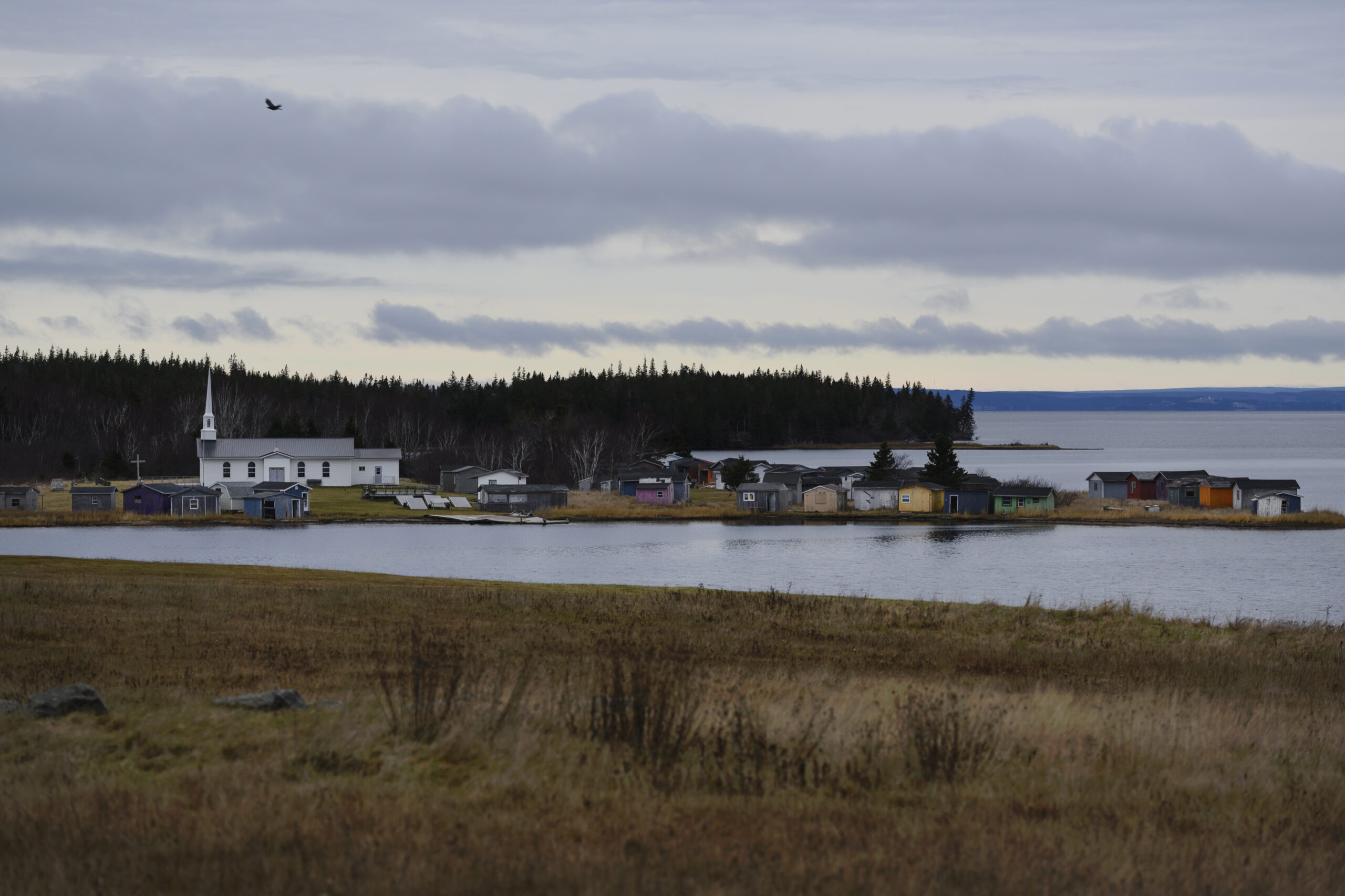
Potlotek, or Chapel Island, N.S. For centuries, this area has been a place of spiritual gatherings, grand council meetings, burial sites and dance circles for the Mi’kmaq community. Photo: Darren Calabrese / The Narwhal
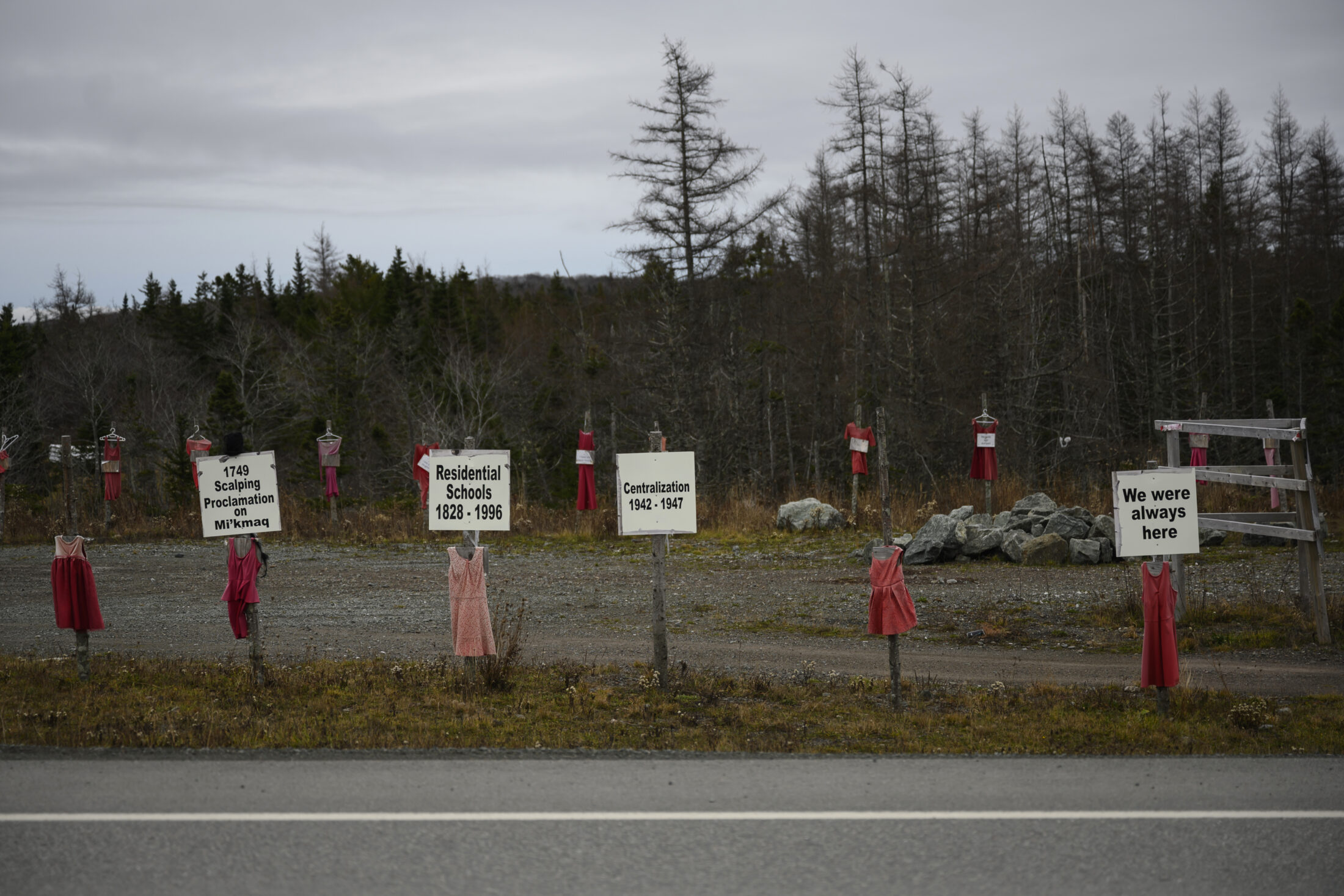
Signs and red dresses symbolizing Missing and Murdered Indigenous Women and Girls are seen next to the highway running through Potlotek First Nation. Photo: Darren Calabrese / The Narwhal
MacDonald said he feels Indigenous moderate livelihood fisheries are not playing by the rules and said the federal government has invested in and included First Nations communities in the commercial fishing industry over the last 20 years. Potlotek First Nation, for example, already owns two of 63 commercial lobster licenses for St. Peter’s Bay.
“They’re fishing at a time that is shut to commercial fisheries due to conservation. This is creating real havoc within the community. We follow a set of laws and the same laws that we follow are being violated by this fishery,” MacDonald said. “We follow those rules. So should everybody.”
But as Fisheries Minister Bernadette Jordan and Crown-Indigenous Relations Minister Carolyn Bennett have made explicit, Indigenous moderate livelihood fisheries are, in fact, legal fisheries. And while commercial harvesting of lobster is limited to specific months to regulate the fishery for conservation reasons, there is no evidence First Nation fisheries threaten lobster populations.
Despite ongoing differences around the nature of commercial versus moderate livelihood fisheries, people have generally felt safer in St. Peter’s Bay than they have in other places in Nova Scotia.
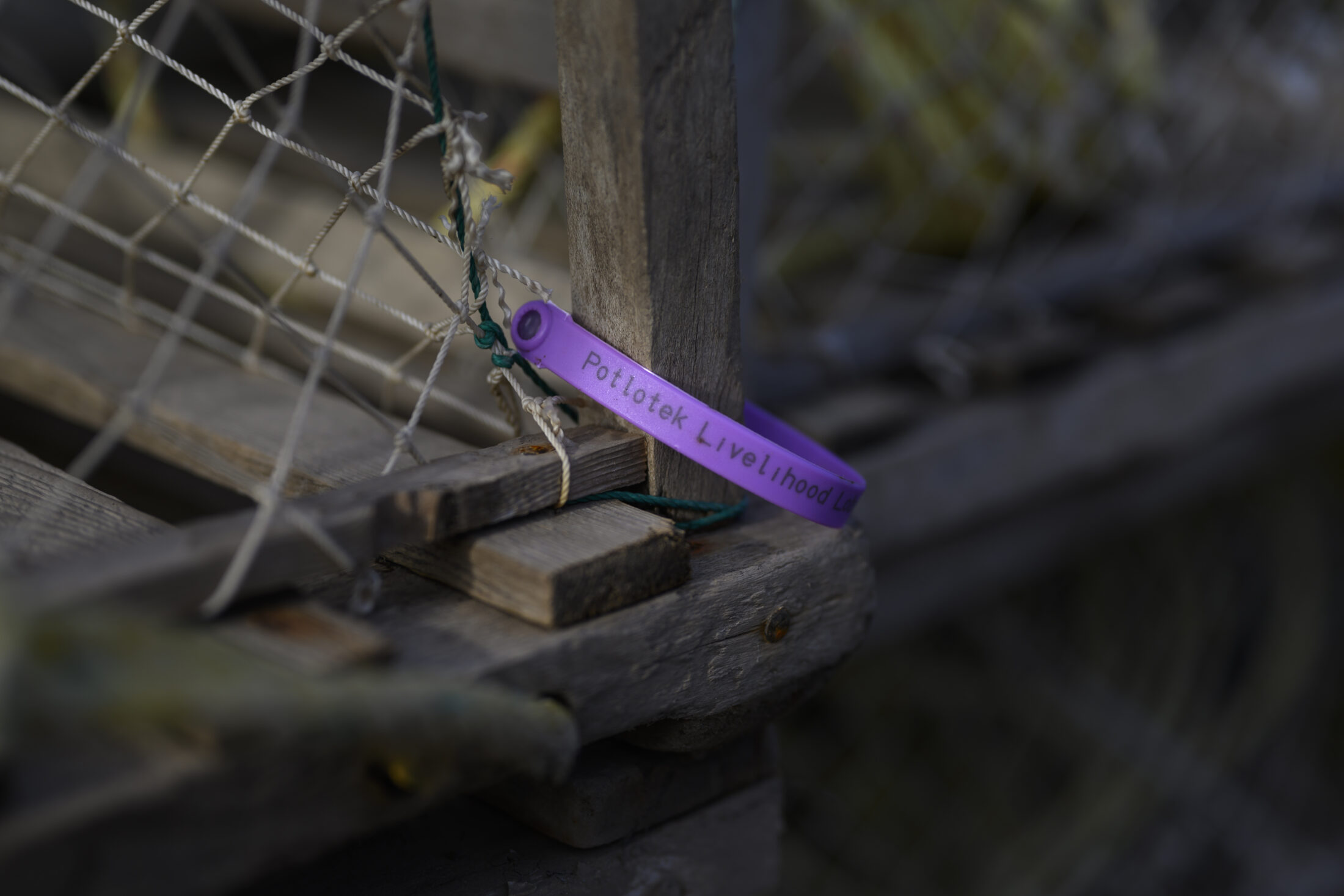
A moderate livelihood lobster tag designates a wooden lobster trap as belonging to members of the Potlotek First Nation. All Mi’kmaq have a right to fish in order to sustain a “moderate livelihood,” but the undefined nature of the term has provided ground for non-Indigenous individuals to harass and threaten Indigenous fishers. Photo: Darren Calabrese / The Narwhal
No one is watching their back in quite the same way as Mi’kmaq fishers in Saulnierville, where the Sipekne’katik First Nation sought a court injunction to protect Indigenous fishermen on the wharf and out on the water.
The need to forge ahead with moderate livelihood fisheries can be pressing in a place like Cape Breton Island, where jobs are scarce and fishing and tourism are the main sources of employment. The unemployment rate is 15.9 per cent, one of the highest of any province or municipality in Canada, according to the Nova Scotia government. The island also has the second-highest child poverty rate in Canada, says Statistics Canada.
The moderate livelihood is giving people hope for much-needed jobs and a chance of overcoming poverty.
“It will make a difference for everyone,” Michael Basque says. “Every one of our native communities in Nova Scotia are poor. And they shouldn’t be poor. I’m not saying we should be rich, but we have a right to fish and everybody that’s trying to hold us back is one of the reasons why our communities are poor.”
Johnson, the teenager, excitedly skipped school to learn how to lobster fish with band members from Potlotek. He’s jumped from boat to boat, soaking up whatever new skills and knowledge he could get over the last few months. Next year he plans to start saving up for his own boat. “I just want to get out there,” he says. “I love it.”
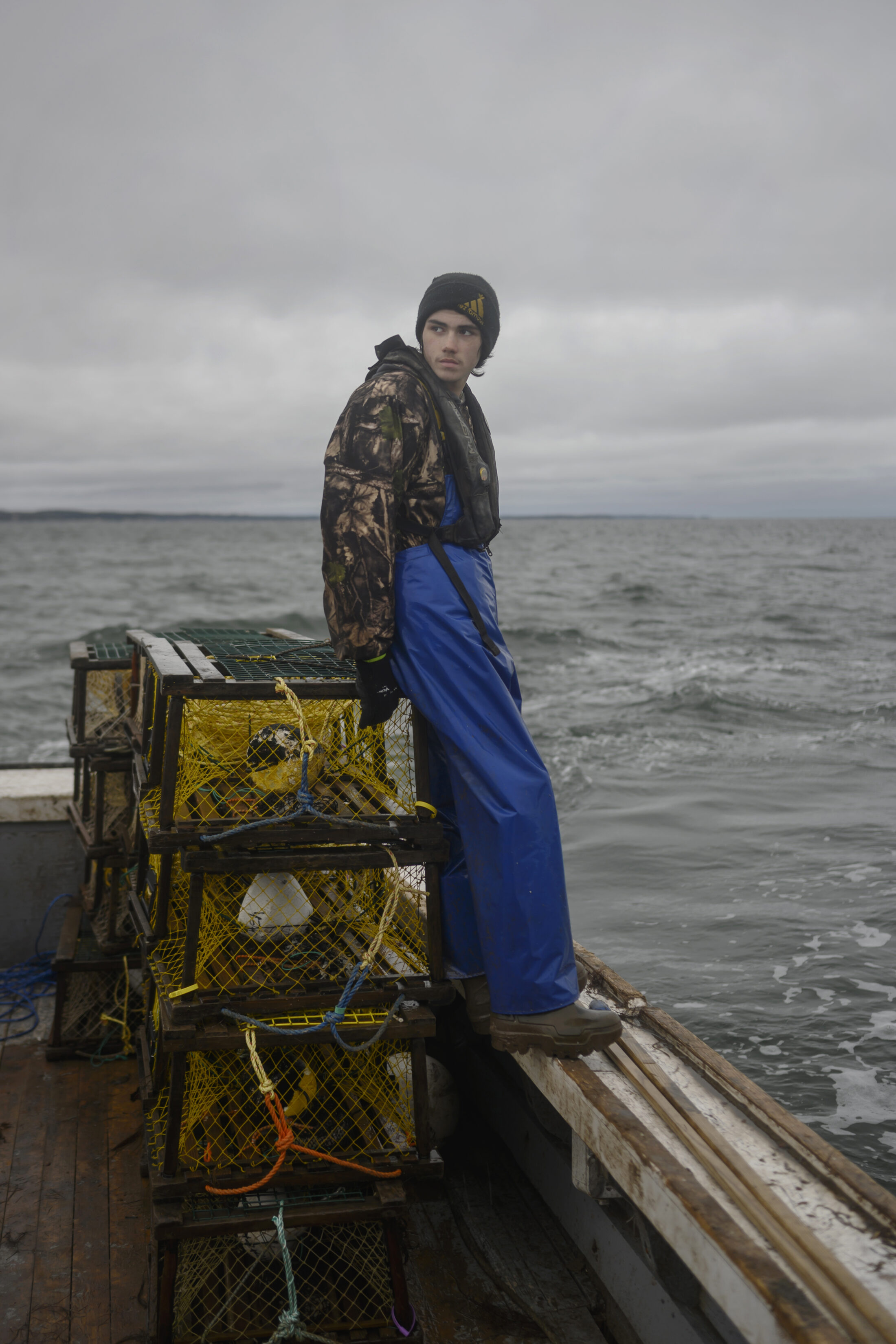
Johnson pauses briefly between hauling lobster traps. Photo: Darren Calabrese / The Narwhal
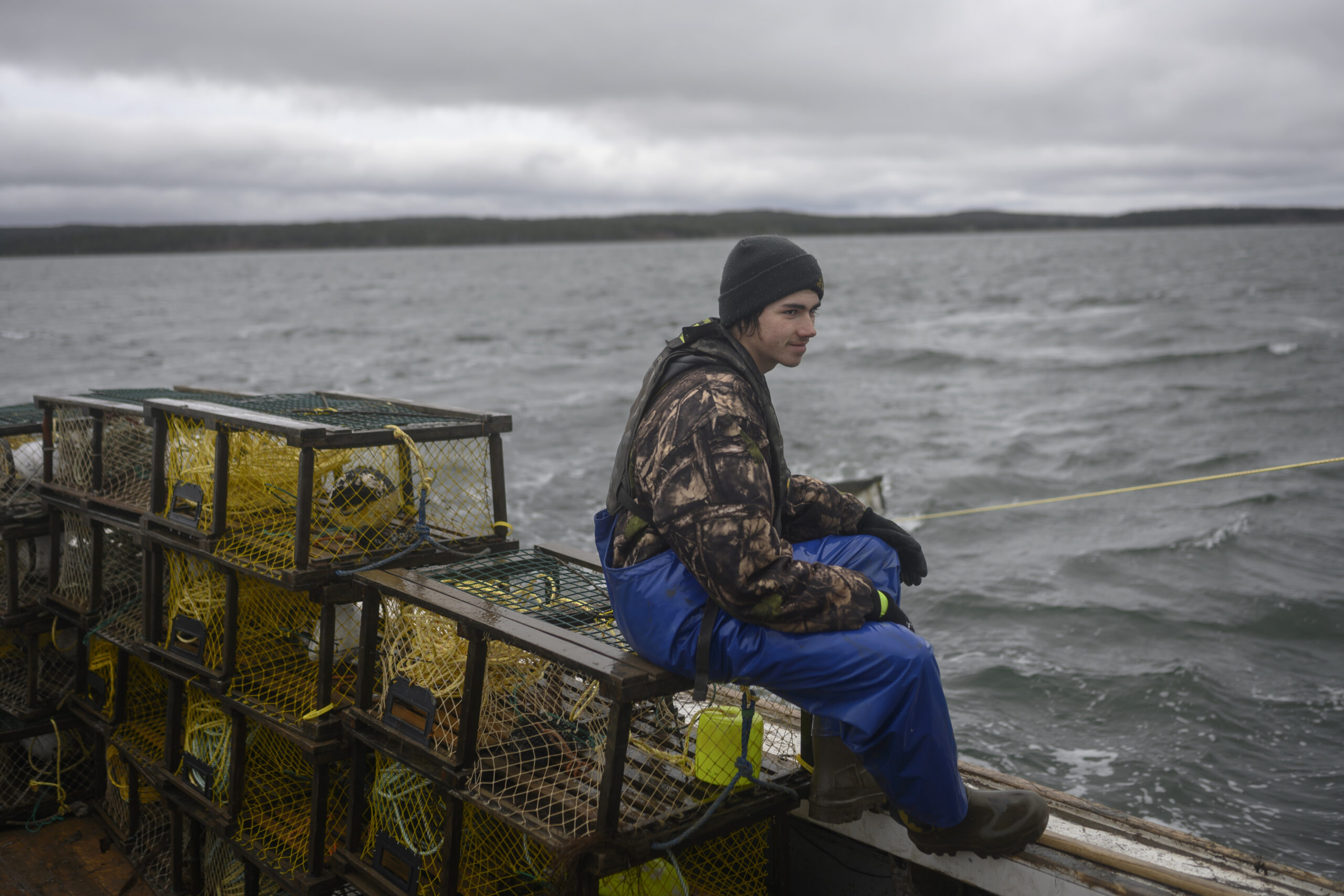
Johnson, who has fished on several Potlotek vessels, said one day he would like to own his own boat. Photo: Darren Calabrese / The Narwhal
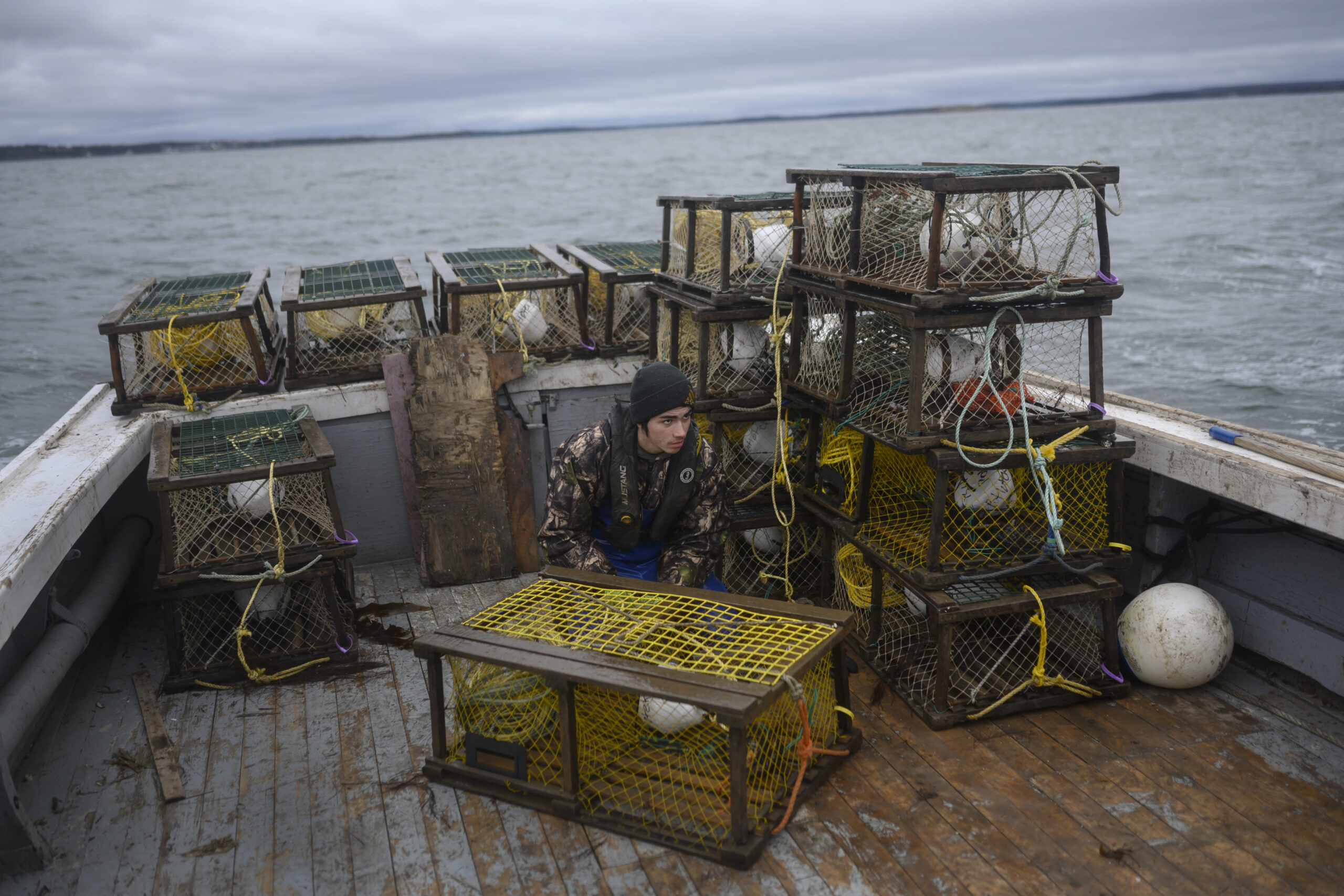
Johnson mends traps that the crew believes were slashed by vandals who do not support the Indigenous moderate livelihood fishery. Photo: Darren Calabrese / The Narwhal
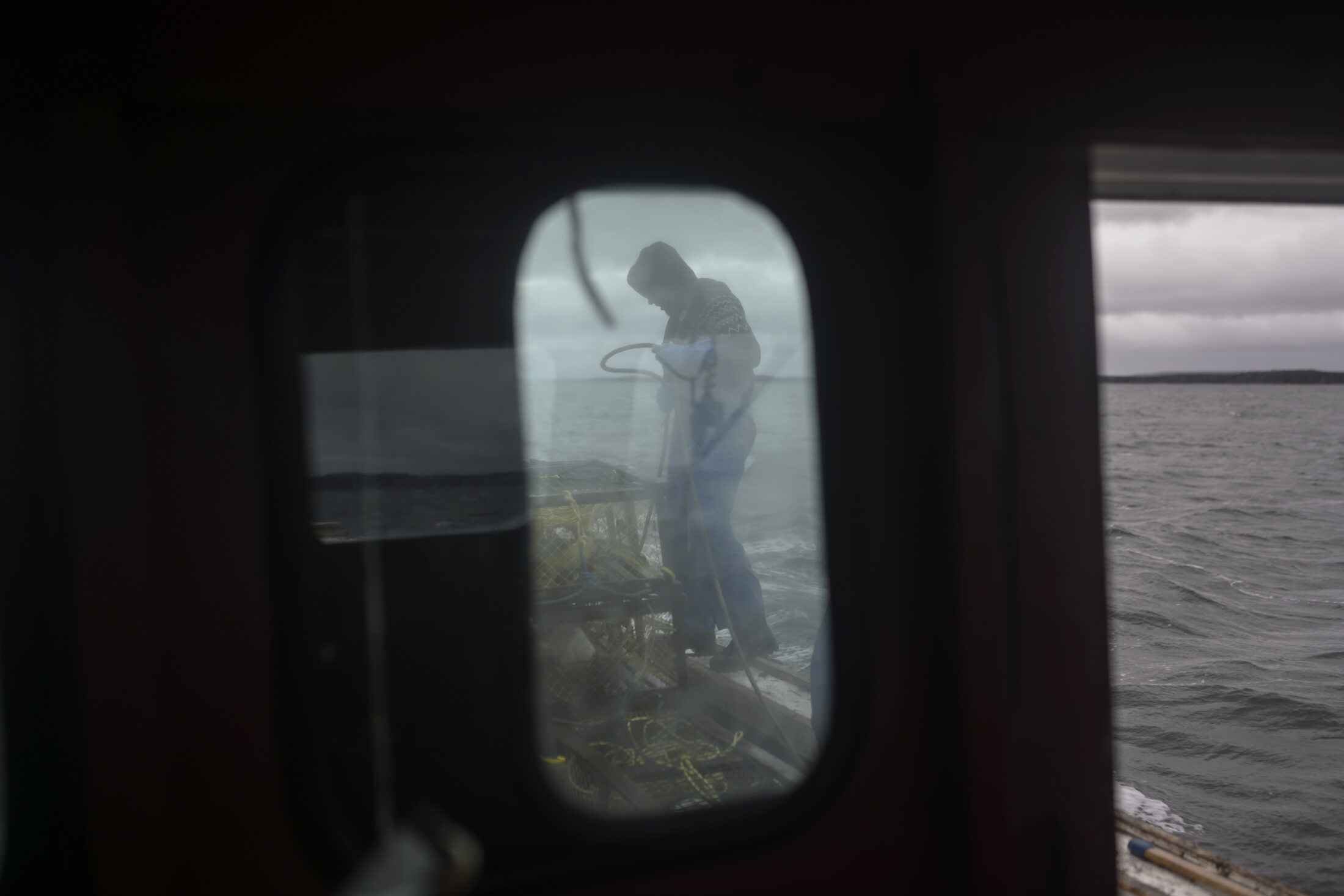
Avery said spending time out on The Seventeen52 has been good for him, physically and mentally. He hopes one day he can learn to fish for more than just lobster under Potlotek’s new fishery. Photo: Darren Calabrese / The Narwhal
The fresh air and physical work have improved Avery’s mental health. Avery, who lives with his grandmother in Eskasoni First Nation, an hour-plus drive away, says he can now afford to buy his own food, put money in his friends’ gas tanks. He also makes enough money to help his mother, who has three kids at home.
“I’m hoping that I can fish other things — elvers and crab, maybe tuna in the future under moderate livelihood,” Avery says. “In the future, I’ll be able to teach somebody like people are teaching me now.”
Potlotek First Nation Chief Wilbert Marshall says he’s encouraged by what his fishermen have accomplished, even though he says catches have been minimal.
“This is only the beginning,” he said. “We’re going to continue fighting. We’re not stopping here.”
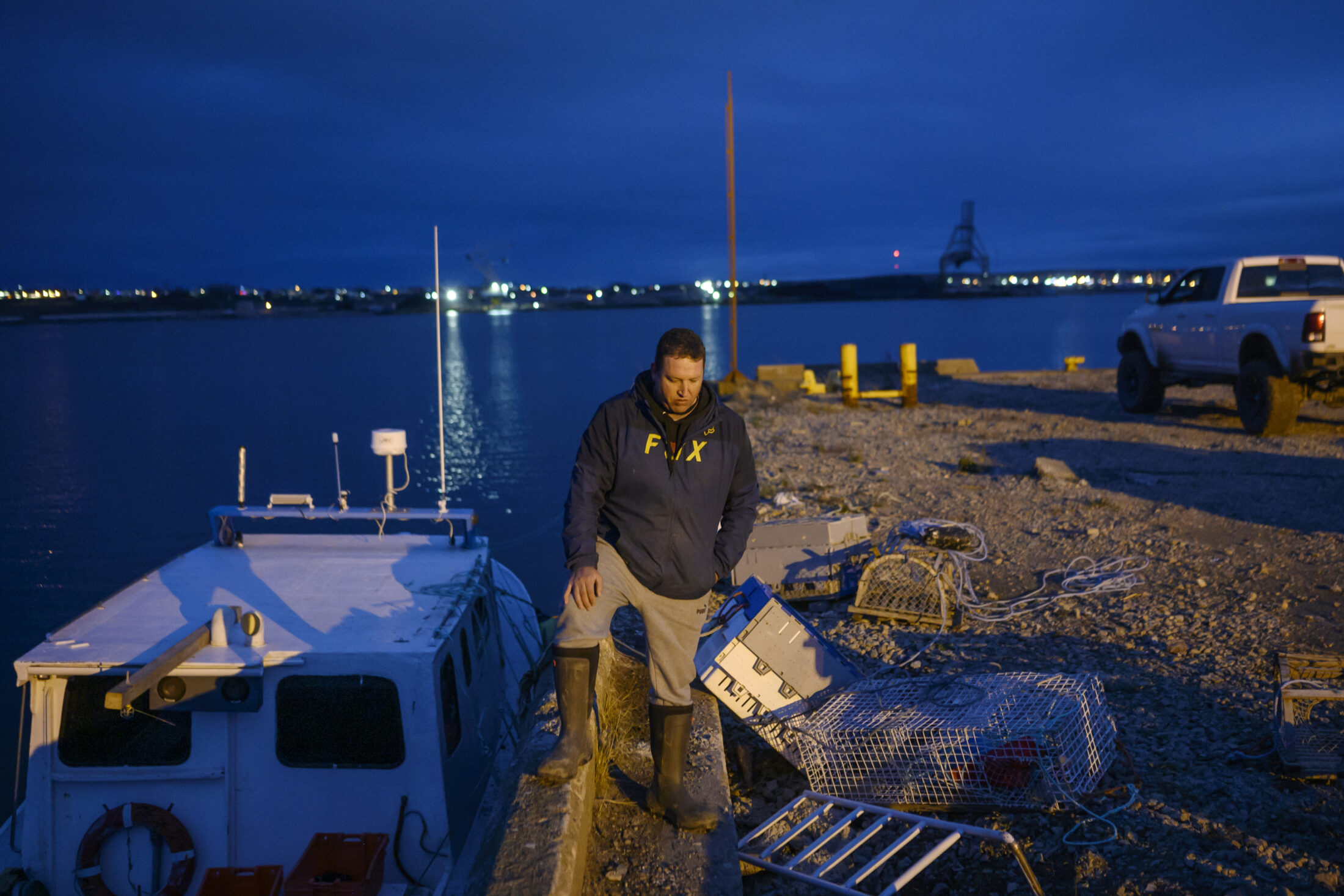
Mi’kmaq fisher John Paul, of Membertou First Nation, stands on the wharf near his boat in the Sydney Harbour on Cape Breton Island after checking his traps. Photo: Darren Calabrese / The Narwhal
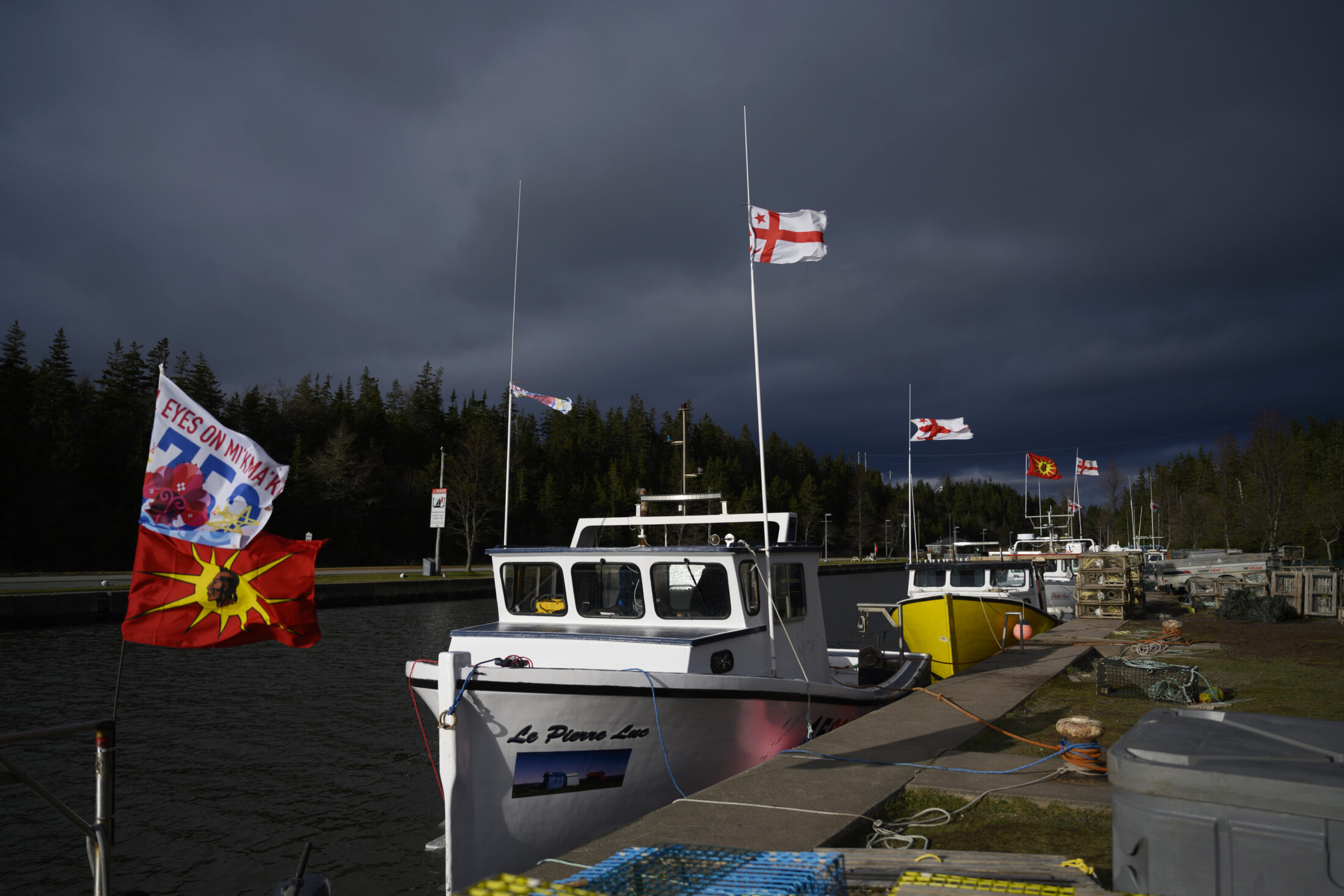
Mi’kmaq lobster boats from Potlotek First Nation are seen at the wharf in St. Peter’s Bay on Monday, Dec. 7, 2020, as high winds ground fishers for a day. Photo: Darren Calabrese / The Narwhal
While Jordan, Minister of Fisheries, Oceans and the Canadian Coast Guard, has said she is working closely with First Nations groups to implement Treaty Rights, talks have stalled with Sipekne’katik First Nation.
“DFO does not have the desire nor the ability to recognize and implement our constitutional right through a respectful process,” Chief Michael Sack stated in a December press release.
A Fisheries and Oceans Canada spokesperson says the government has heard Chief Sack and is continuing to work with the First Nation on the best path forward.
“Reconciliation is not a linear or simple process, but it is imperative,” communications advisor Robin Jahn wrote in response to questions from The Narwhal. “We continue to work to address challenges as they arise, nation-to-nation.”
Three Mi’kmaq parliamentarians have recommended moderate livelihood fisheries be managed under a new Atlantic First Nations Fisheries Authority to pursue reconciliation outside of the complicated history between Mi’kmaq bands and Fisheries and Oceans Canada.
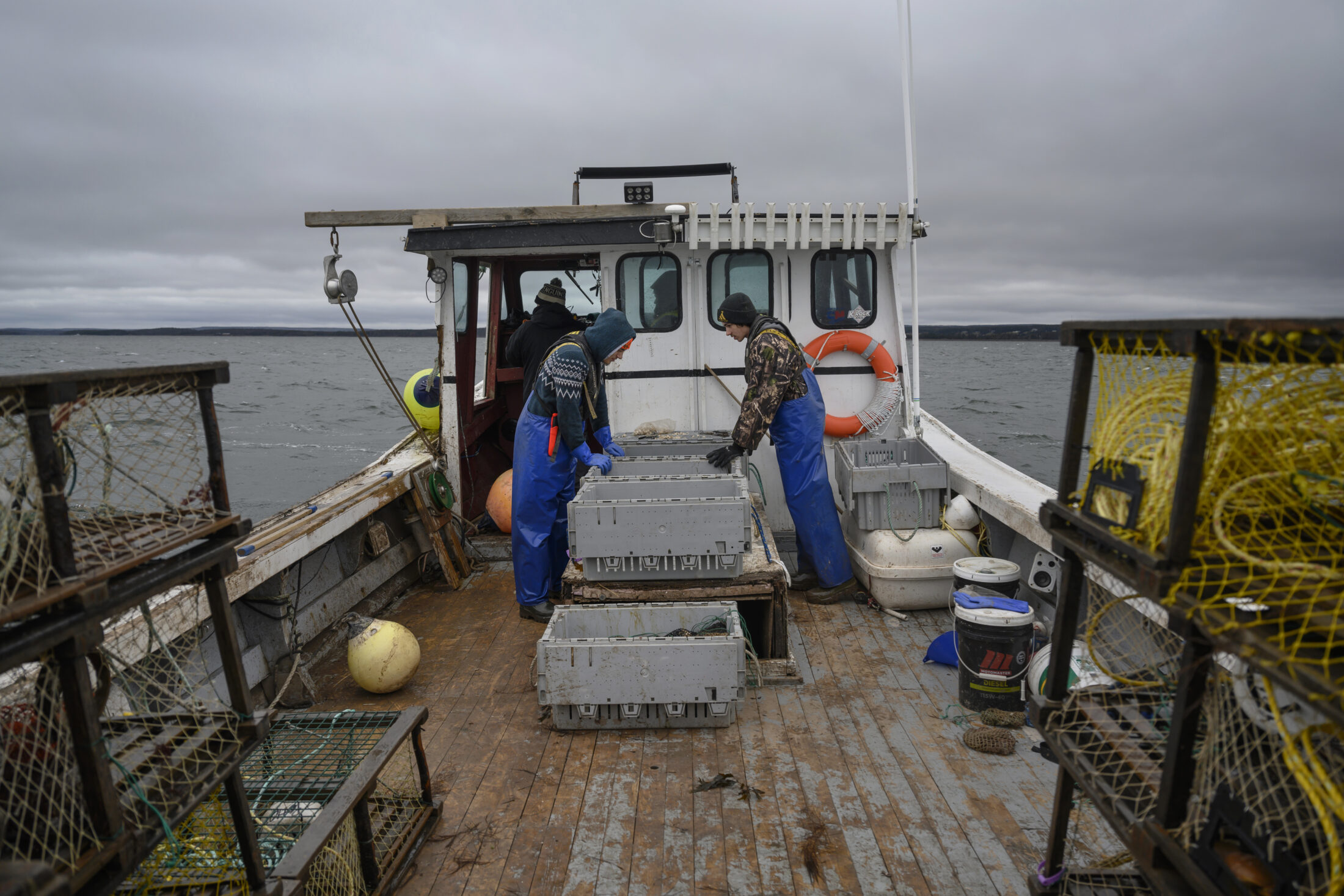
Avery and Johnson pause briefly during their work. The two young fishers represent a new horizon for Mi’kmaq-managed fisheries. Photo: Darren Calabrese / The Narwhal
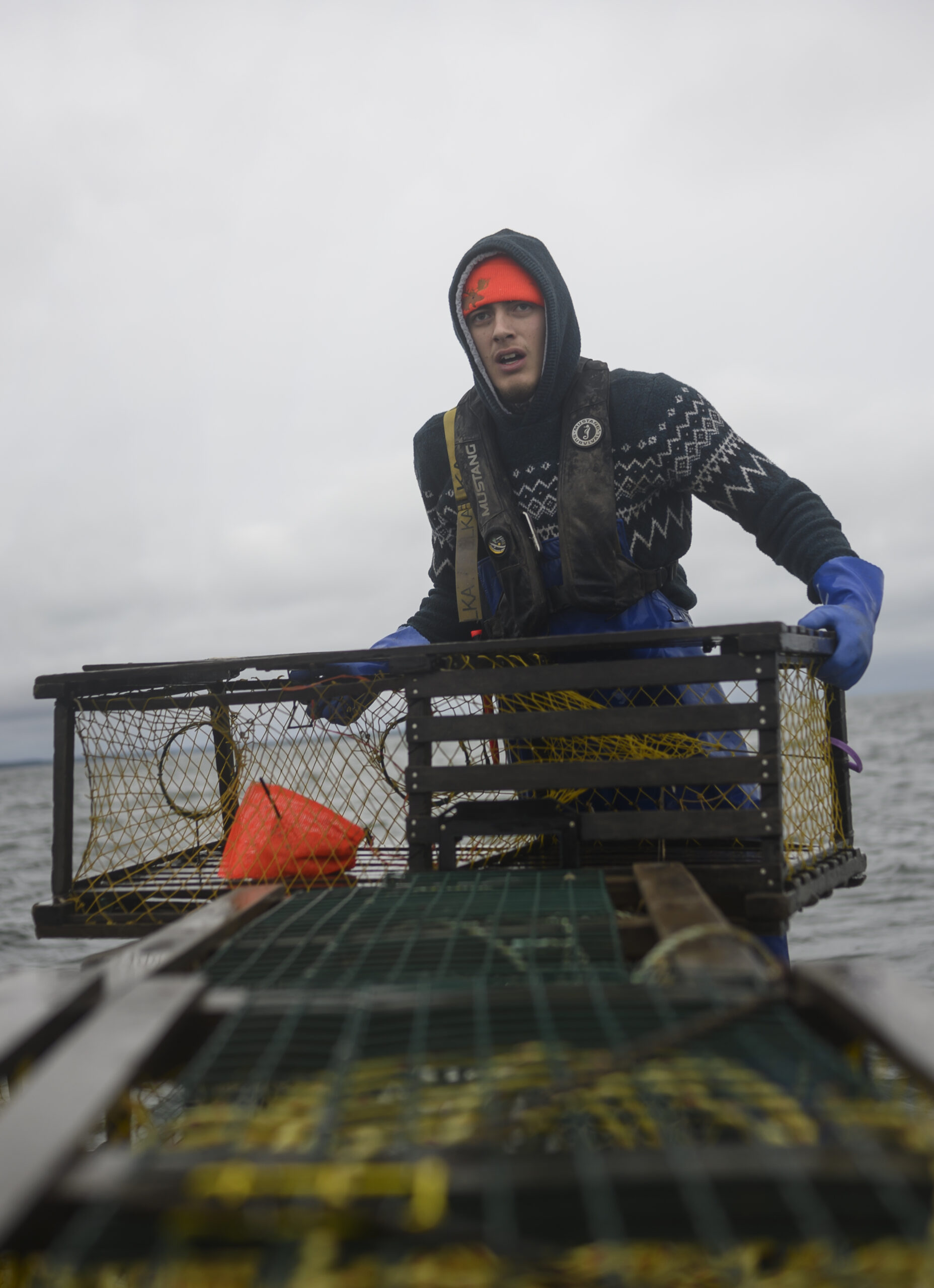
Avery said he feels like he is “at the forefront of history” as he participates in Potlotek’s new fishery. Photo: Darren Calabrese / The Narwhal
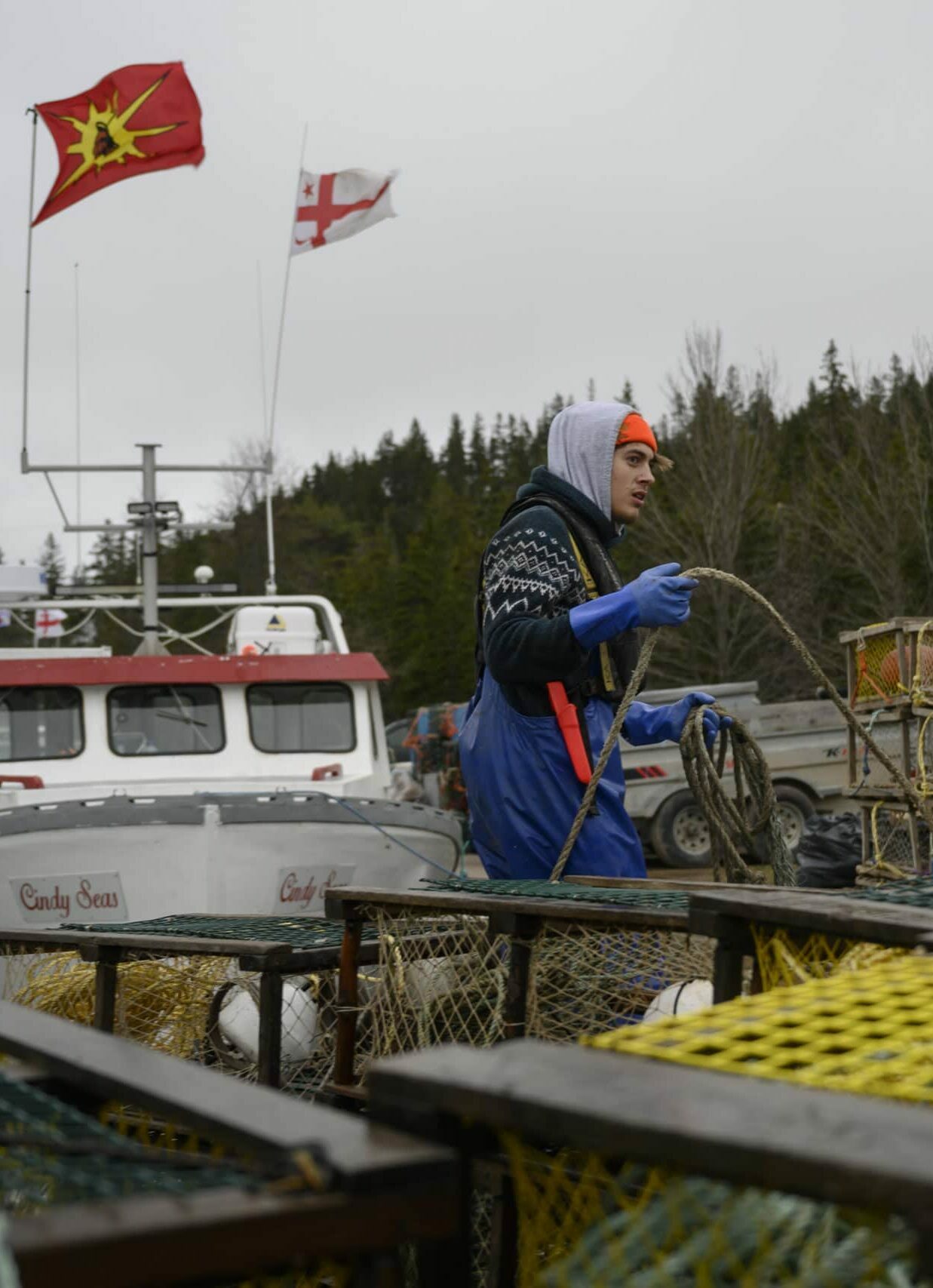
Avery prepares to tie up to the wharf upon returning from hauling traps. Photo: Darren Calabrese / The Narwhal
While clearly there is still a lot to be worked out, the launch of several moderate livelihood fisheries in Nova Scotia is heartening and represents a historical milestone in the “long, long struggle” for First Nations rights, says Daniel Paul, a historian and author of We Were Not The Savages.
In the past, treaties haven’t been recognized and Mi’kmaq and other First Nations people have been excluded from society almost universally across the country until very recent times, Paul said.
“We’re beginning to catch up with lost time that has prevented us from participating in economic life in Canada.”
Meanwhile, on board The Seventeen52 after a morning of hauling traps, the Basques and Johnson netted just half a crate of lobster, worth about $300. Six of their traps had been vandalized.
Next year it’ll be better, they say. Father and son plan to refurbish the boat so they can head a little farther afield, and now at least they have a few months of experience.
“I feel like I’m at the forefront of making this happen,” Avery says, cracking a Red Bull and grinning as the boat steams back toward the canal. “At the forefront of history.”
Get the inside scoop on The Narwhal’s environment and climate reporting by signing up for our free newsletter. On a warm September evening nearly 15...
Continue reading
10 billion litres of sewage are dumped into Winnipeg’s lakes and rivers each year. Some...

Court sides with Xatśūll First Nation, temporarily halting Mount Polley mine waste expansion

Break out the champagne: Emma’s storied life and leadership in journalism has earned her the...
